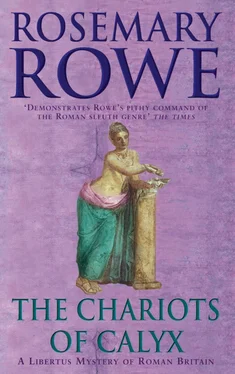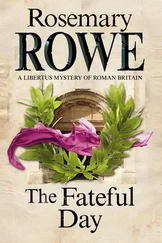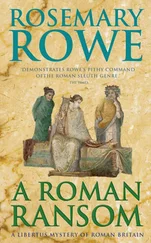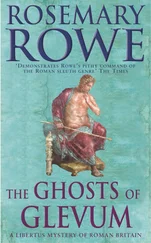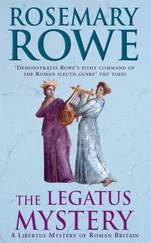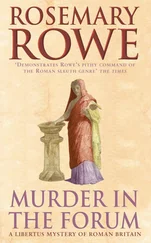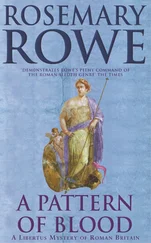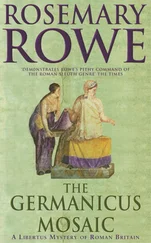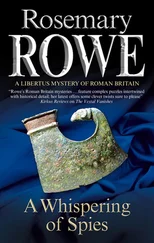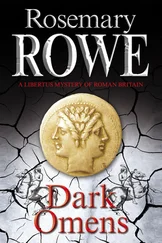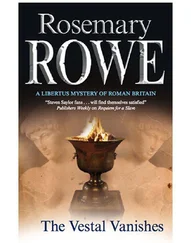Rosemary Rowe - The Chariots of Calyx
Здесь есть возможность читать онлайн «Rosemary Rowe - The Chariots of Calyx» весь текст электронной книги совершенно бесплатно (целиком полную версию без сокращений). В некоторых случаях можно слушать аудио, скачать через торрент в формате fb2 и присутствует краткое содержание. Год выпуска: 2002, ISBN: 2002, Издательство: Headline, Жанр: Исторический детектив, на английском языке. Описание произведения, (предисловие) а так же отзывы посетителей доступны на портале библиотеки ЛибКат.
- Название:The Chariots of Calyx
- Автор:
- Издательство:Headline
- Жанр:
- Год:2002
- ISBN:9781472205087
- Рейтинг книги:5 / 5. Голосов: 1
-
Избранное:Добавить в избранное
- Отзывы:
-
Ваша оценка:
- 100
- 1
- 2
- 3
- 4
- 5
The Chariots of Calyx: краткое содержание, описание и аннотация
Предлагаем к чтению аннотацию, описание, краткое содержание или предисловие (зависит от того, что написал сам автор книги «The Chariots of Calyx»). Если вы не нашли необходимую информацию о книге — напишите в комментариях, мы постараемся отыскать её.
The Chariots of Calyx — читать онлайн бесплатно полную книгу (весь текст) целиком
Ниже представлен текст книги, разбитый по страницам. Система сохранения места последней прочитанной страницы, позволяет с удобством читать онлайн бесплатно книгу «The Chariots of Calyx», без необходимости каждый раз заново искать на чём Вы остановились. Поставьте закладку, и сможете в любой момент перейти на страницу, на которой закончили чтение.
Интервал:
Закладка:
He nodded. ‘There would have been a lot of blood.’
‘There was.’ Remembering that dreadful scene, I was glad of the glass of wine in my hand, although it is not my favourite drink. ‘Will she be tried for murder, Excellence?’
He shook his head. ‘Not unless one of the family brings a charge, and in any case Lydia could claim the law of talio , rightful retribution. Monnius was her protector and the father of her son. Fulvia murdered him, so she did have cause. It would be hard for any court to sentence her.’
‘Except, of course, she did not know that at the time.’
He gave one of his rare smiles. ‘So why did she do it? Jealousy?’
‘She was afraid that Fulvia would bring a querela against the changing of the will. Lydia kept talking about the courts. It did not occur to me at first, but the law requires seven witnesses. We know that Fortunatus was one of them — but he is not a citizen. He bought his freedom, true, but he has no voting rights. There would be cause for question in the courts, and you know what that can do to an estate.’
‘I see. Filius would inherit at least half, of course, since he is the eldest son, but if Fulvia got the town house, as she clearly thought she would, Lydia would find herself without a home. I don’t imagine Fulvia would welcome her.’
‘I think she did it for Filius, not herself. She claims it was for him, and I believe her. Half his inheritance was at stake — and his dignity. Fulvia took his rightful place in the procession, too. I think it was that, above all, which sealed her fate. I noticed that Lydia was holding herself oddly when she came out of Monnius’ room. Obviously, she was hiding the dagger under her cloak then — it was in Monnius’ room, but it was to be offered as part of the grave-goods so no one would have noticed it was missing. I suspected nothing at the time, and Lydia is so ungainly that her awkwardness was not remarkable.’
Pertinax popped another pickled nut into his mouth. ‘So she will claim talio . She will be banished from the town, at worst. But the family would be chased out anyway. People do not take kindly to a frumentarius who cheated them — and Annia Augusta was implicated too, you say?’
‘I’m sure of it, Excellence. I knew it as soon as I saw her with Eppaticus, though I was exceptionally slow in working it out. She was the one who started the alarm, you will remember, both for the money and the missing document. We know that Fulvia hid the money, and why, but that did not explain the document, nor why the money disappeared again.’
‘Annia Augusta found it, I assume?’
‘I led her to it, without meaning to. She found me on my knees, and when I had gone she discovered the hiding place herself. Then, when Eppaticus came back, she paid him what was owed. She admitted that. So why did she not simply tell me so? Why not restore the money to the estate? And why was there “no paper for the warehouse” as Eppaticus said? She must be hiding something — perhaps for Monnius, but he was dead. More likely for herself.’
Pertinax was watching me intently. ‘Go on.’
‘I began to see how pieces of the pattern linked together. Annia Augusta had a large estate, which she insisted on managing herself, through a steward, often against Monnius’ advice. It was “towards the sea”, you told me, which must mean to the east, because we drove to Londinium from the setting sun, and met no oceans on our way. But I learned from the warehouse I visited that there had been bad rainstorms in the east, and many harvests were ruined in their stacks.’
‘Including hers?’
‘That seems most probable. It was common knowledge in the household that Annia had scorned to use Monnius’ drying floors. Your boatman had the answer, Excellence. He complained of sacks of grain half rotting when the baker got them home, and I know how it was done. The chief clerk at the warehouse wearied me with his account of corn, but I am grateful now. Damp rye or barley can be mixed with spelt, which must be roasted before it’s threshed. The spelt is placed at each end of the sack and does not rot, although the poor grain in the middle sprouts and spoils. And the buyer cannot see it. Of course it is an easy matter, with the distribution chutes, to fill the sacks like that. And once the grain is sold, it is remarkably difficult to prove.’
Pertinax was frowning. ‘And what has Eppaticus to do with this? It was Annia’s corn.’
‘He bought the crop from Annia, and sold it back to Monnius. That way, if there were complaints, it could not be traced back to the family. It was a huge risk for Eppaticus, of course — you know the law. The bargain had to be settled in cash, and once the money had changed hands the owner of the corn was legally responsible. No wonder he panicked when Monnius was murdered before he paid.’
‘Yet he came back to the house a second time?’
‘He was desperate for the money to pay his gambling debts. Men like Glaucus are not patient with those who owe them money — especially large sums of it. He must have been delighted when Annia found the money and agreed to pay him — he was already down by the whole price of the transaction, since he was obliged to pay her in cash in the first place, to make the contract legal. But he was worried at not having a receipt, and no warehouse records. Without the documents he had no proof of anything.’
‘That was why Annia removed the documents? To see to it that he was still legally responsible?’
‘I don’t think so, Excellence. She was simply worried that any investigation into Monnius’ death — and the stolen cash — might bring to light the business of the corn. When the money went missing, she hid the documents. I have no doubt they’ll be found among her things. There was a lot of money at stake — it represented a whole season’s earnings for the farm. Of course, there was a profit for the warehouse too.’
Pertinax looked grim. ‘Buying half-rotten corn cheap, and selling it at the proper price — there was a little fortune to be made. The warehouse supervisor had to know, that’s clear, and he doubtless got his share of the profit. I shall have him arrested instantly. Odd that I have never heard complaints.’
‘There have been murmurs, Excellence. Of course, the army and the racing teams would always get the best, but the baker and his like can complain all they wish — nobody pays attention until there is a riot.’
‘But there are laws. Interfering with the corn supply is a serious crime.’
I grinned. ‘I know. The warehouse supervisor must have been terrified when we turned up and he had to show us round, though he avoided taking us to the particular grain loft in question. I did find damp rye and spelt grain mixed. I’m sure the system had been perfected many times. The only difference on this occasion was that the rotten corn was Annia’s own. No doubt, like any owner of a farm, she was glad to get any price at all for her worthless crop. Monnius saw that she did not lose, even though she had ignored his advice.’
Pertinax sighed. ‘Well, all those responsible will be charged at law. Eppaticus too. There will be heavy fines. Upsetting the supply of corn can destabilise the whole city.’
‘Poor Eppaticus! I doubt he ever saw the grain, although he stood to make a very neat profit by buying and selling it without asking too many questions. I don’t think he has even got anywhere to store it. That is what I sent Junio to confirm.’ I frowned. ‘What has happened to Junio, by the way? I saw him briefly when he first came back, but he went scuttling off again saying he had a mission to perform for you, and I haven’t seen him since. I hope nothing has happened to him ?’
Читать дальшеИнтервал:
Закладка:
Похожие книги на «The Chariots of Calyx»
Представляем Вашему вниманию похожие книги на «The Chariots of Calyx» списком для выбора. Мы отобрали схожую по названию и смыслу литературу в надежде предоставить читателям больше вариантов отыскать новые, интересные, ещё непрочитанные произведения.
Обсуждение, отзывы о книге «The Chariots of Calyx» и просто собственные мнения читателей. Оставьте ваши комментарии, напишите, что Вы думаете о произведении, его смысле или главных героях. Укажите что конкретно понравилось, а что нет, и почему Вы так считаете.
